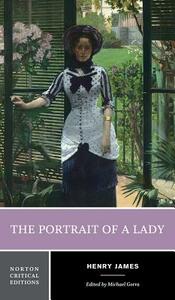Take a photo of a barcode or cover
Devastatingly good. The pull of the story, unstoppable. Absolutely engrossing.
I realize that I'm supposed to gush over this novel. I realize that it is hailed as a masterpiece of literature and, in particular, counted among the greatest works of Henry James. I realize that by failing to join in the enormous chorus of praise for this book, I risk being dismissed as a boor, a bumpkin, or simply a blithering idiot. That's fine by me.
When my parents moved from their house to a condo more than ten years ago, they gave away much of their library, and I took many books, including this one. Some weeks ago I found it among the hundred or so unread volumes on my shelves, and, for some inexplicable reason, I decided that it would be next in line. I had never read anything by James, so I was curious. The copy I have was, incidentally, my father's when he was an undergraduate. His perfunctory handwritten notes in the margins lead me to believe that he was no more enamored of this novel than I.
As a writer I can't fault James' prose. And, to be fair, there were a couple characters who did not irk me in the extreme. But that exhausts my catalogue of praise for this overblown, overwrought, overrated work.
I have read a wide sampling of reviews, and I understand the various arguments in support of the book's supposed merits. Some claim that it's a Victorian-era meditation on the dichotomy between the Old and New Worlds. Others insist that it is primarily a cautionary tale about the power of wealth to corrupt innocence. There are even those who insist that it earns a place of note as a piece of early feminist literature since, after all, the protagonist does make her own choices, even if they are abominable choices. Or that James foreshadows existentialism, or even absuridsm in various ways.
I find nothing so deep in James' work. Perhaps this book simply hasn't aged well. Apart from being interminably long (the edition I read, at 850+ pages, could easily have been reduced to a lean 100 while losing very little other than gristle and fat), this is one of those classics which exposes the sheer ugliness of the era in which it was written. If it's a meditation on anything, it would be white privilege as exemplified by the ruling patriarchy. If it serves as any sort of cautionary tale, it's one about the power of superficiality and cunning winning out over substance and integrity. If the protagonist makes her own choices it is not because she's empowered, it's because, like almost every single character in this novel, she is vapid, shallow, conceited, petty, stubborn, and idiotic; none of the characters exhibits growth. And the fact that she scuttles her own life by following a series of seemingly arbitrary whims, and that James chooses to provide an ambiguous ending, speaks less to profundity than it does to expediency, which is to say that it struck me as lazy and inconsiderate.
James' insufferable verbosity makes sense when one considers that this novel was originally serialized. And most of the faults I've noted are understandable given the fact that we are, each one of us, products of the milieus in which we develop. But sometimes the masterpieces of the past don't stand the test of time, and this is certainly a case in point. The best thing about this novel, just like a root canal, is that it ends. But at least the root canal has the advantage of making its recipient feel better.
When my parents moved from their house to a condo more than ten years ago, they gave away much of their library, and I took many books, including this one. Some weeks ago I found it among the hundred or so unread volumes on my shelves, and, for some inexplicable reason, I decided that it would be next in line. I had never read anything by James, so I was curious. The copy I have was, incidentally, my father's when he was an undergraduate. His perfunctory handwritten notes in the margins lead me to believe that he was no more enamored of this novel than I.
As a writer I can't fault James' prose. And, to be fair, there were a couple characters who did not irk me in the extreme. But that exhausts my catalogue of praise for this overblown, overwrought, overrated work.
I have read a wide sampling of reviews, and I understand the various arguments in support of the book's supposed merits. Some claim that it's a Victorian-era meditation on the dichotomy between the Old and New Worlds. Others insist that it is primarily a cautionary tale about the power of wealth to corrupt innocence. There are even those who insist that it earns a place of note as a piece of early feminist literature since, after all, the protagonist does make her own choices, even if they are abominable choices. Or that James foreshadows existentialism, or even absuridsm in various ways.
I find nothing so deep in James' work. Perhaps this book simply hasn't aged well. Apart from being interminably long (the edition I read, at 850+ pages, could easily have been reduced to a lean 100 while losing very little other than gristle and fat), this is one of those classics which exposes the sheer ugliness of the era in which it was written. If it's a meditation on anything, it would be white privilege as exemplified by the ruling patriarchy. If it serves as any sort of cautionary tale, it's one about the power of superficiality and cunning winning out over substance and integrity. If the protagonist makes her own choices it is not because she's empowered, it's because, like almost every single character in this novel, she is vapid, shallow, conceited, petty, stubborn, and idiotic; none of the characters exhibits growth. And the fact that she scuttles her own life by following a series of seemingly arbitrary whims, and that James chooses to provide an ambiguous ending, speaks less to profundity than it does to expediency, which is to say that it struck me as lazy and inconsiderate.
James' insufferable verbosity makes sense when one considers that this novel was originally serialized. And most of the faults I've noted are understandable given the fact that we are, each one of us, products of the milieus in which we develop. But sometimes the masterpieces of the past don't stand the test of time, and this is certainly a case in point. The best thing about this novel, just like a root canal, is that it ends. But at least the root canal has the advantage of making its recipient feel better.
I don't want to say that this book was dense, but an entire solar system flew into it while I was reading it...
So far so good... gonna pick up where I left off, since I finished the Dark Tower series.
600+ pages of disappointment. Shit story with shit characters making shit decisions.
tell henry james to get a grip and stop copying other people's stories
Well, it took me seven years to read this, according to Goodreads. The review comparing reading James to going to the gym is spot on: I committed to this book five days ago and read 333 pages. For some reason, his meandering text clicked, revealing really deep insights and thought processes.
It’s also wild that this was written around 1880 — it made me think Isabel would have a lot more options today (and that Henrietta would be more of an icon). Since it was, we have to see Isabel get herself into this mess and then sort of pull herself out of it, albeit very slowly. And what does the end mean? Will she give Osmond what he deserves or will she be an independent but chained and unhappy wife? Is Goodwood encouraged by whatever Henrietta says to him, that he should just wait out Isabel?
It’s also wild that this was written around 1880 — it made me think Isabel would have a lot more options today (and that Henrietta would be more of an icon). Since it was, we have to see Isabel get herself into this mess and then sort of pull herself out of it, albeit very slowly. And what does the end mean? Will she give Osmond what he deserves or will she be an independent but chained and unhappy wife? Is Goodwood encouraged by whatever Henrietta says to him, that he should just wait out Isabel?
3.5 I ACTUALLY KINDA LIKED PORTRAIT OF A LADY. SO SUE ME.
Though I found the plot itself of interest, I am personally not a fan of Mr. Henry James' style. James rambled and rambled and his long, overdrawn sentence structure made reading this story a bit of a struggle.





